…when we’re talking about governance and having strong capacities, institutions that work, obviously national security is a priority. And so, when you’re pulling down these pieces, whether it’s not enforcing the Foreign Corrupt Practices Act, or DOJ offices that deal with kleptocracy and sort of investigation of foreign as well as domestic actors, it opens the door to potential threats to the United States.
Jonathan Katz
Democracy is upheld not by one president or the powerful few, but by democratic actors at every level—individual, local, state, and national. In this episode, host Katie Dunn Tenpas and Jonathan Katz, a fellow in Governance Studies at Brookings, explore how to create and safeguard a positive vision for U.S. governance by examining the core pillars of democracy. This is the final episode of season two of Democracy in Question.
- Listen to Democracy in Question on Apple, Spotify, or wherever you like to get podcasts.
- Watch episodes on YouTube.
- Learn about other Brookings podcasts from the Brookings Podcast Network.
- Sign up for the podcasts newsletter for occasional updates on featured episodes and new shows.
- Send feedback email to [email protected].
Transcript
[music]
TENPAS: Hi, I’m Katie Dunn Tenpas, a visiting fellow in Governance Studies at the Brookings Institution and director of the Katzmann Initiative on Improving Interbranch Relations and Government. Today’s episode closes out the second season of Democracy in Question, a podcast where we examine current events through the lens of America’s political foundations, thinking about how recent events fit into the broader stream of democracy that runs throughout our history. You can find all episodes of this podcast at Brookings dot edu slash Democracy in Question, all one word. Lastly, listeners, we would love your feedback. Please send thoughts, comments, and reflections to podcasts at brooking dot edu.
So far this season, I and my guests have explored a variety of topics relating to this unique moment in American democracy since President Trump’s inauguration, including how the three branches of government should function according to the Constitution, the influence of billionaires, the importance of civics education, the role of the military, the contributions of immigrants, and the power of protest.
On today’s episode, airing the day before America’s Independence Day, I’m posing the question, how do we safeguard democracy? To answer this question, I’m eager to welcome Jonathan Katz to the podcast. He’s a fellow in Governance Studies and he recently co-edited the “2025 Democracy Playbook,” a report that provides actionable steps for democratic actors in the United States and globally to strengthen democratic institutions and resist illiberal forces. Katz is recognized as an anti-corruption, national security, international development, and democracy expert, having held senior positions in the U.S. government at the State Department, USAID, and on a senator’s staff in Congress.
Jonathan, welcome and thank you so much for joining me today.
KATZ: It’s great to be here.
TENPAS: Yeah, so why don’t we just start from the top. Maybe you could even give me a preamble of how you got interested in this topic and a little bit about the “Democracy Playbook.”
[3:01]
KATZ: Yeah, so you highlighted artfully sort of my long career working in government and both government and then sort of multiple think tanks, but a constant stream throughout my early years, including running congressional campaigns, which you didn’t mention because it was so long ago, was U.S. democracy. So fair and free elections, you know, representation of constituents. Hot button challenging issues, but governance has always been at the center of the work that I’ve done, both from running elections all the way to today.
And so when you talk about a unique or a moment in American history, this is one where democracy is challenged in the United States, which I think we’ll we’ll talk to. And the Democracy Playbook that I co-edited with Ambassador Norm Eisen was largely about how to address what we thought would happen in the U.S. post-election, the challenges that we outlined quite early on before the inauguration in January. But really to help through research, but also from experts globally.
And we talked and engaged with experts in the United States and globally about how to support democracies, democratic resilience. But what are the tools that we can give to and provide to democracy actors? That includes civil society, independent media, citizens, government, non-government. How can we help through best practice globally strengthen democracy? And this includes in democracies that might be backsliding or democracies that are in quite good standing.
But we know through our practice and through the work that we’ve done and experts that we talk to is that democracy is something that you really have to tend to constantly. And we all have a lot to learn from each other, whether you’re in the Global South or Global North, United States, or what we see happening elsewhere globally. So this Playbook is really meant to help those that are trying to address the challenges today.
TENPAS: You have such an interesting international perspective. Can you identify countries that you think have the best examples, or maybe they have experienced democratic backsliding, and so we can learn a lot from them? Are there any in particular that you’d highlight?
[5:17]
KATZ: Yeah, there’s countries including Poland. Poland went through a period where it had a government that came in in 2015 that started to take Poland in a different direction in terms of its democracy, rule of law. We wrote about this in one of our pieces a couple months ago about threats to arts and culture. The government at the time in Poland had really sort of put in place its own people in charge of arts and culture, had really in essence cut off funding for those that they disagreed with.
And this was not only just about culture war, it was about religion. But the bigger concern was taking a country like Poland that after the end of the Cold War had transitioned from a communist country for decades. Obviously, they suffered greatly, Poland, in World War II, and that had transformed themselves into a model democracy. In fact, a great story for the United States, because the U.S. provided a great deal of assistance, democracy assistance, and other assistance, economic assistance for Poland to help them transition.
[6:23]
But what we see in democracies, including new democracies, is that there’s often this tension of backsliding two steps forward, two steps back. And what took place in Poland was a government that came in that was taking Poland in the wrong direction, going after judges, seeking to reshape government to advance their own agenda, not the agenda of the Polish people.
And for the United States at the time, too, it was problematic. We know from our research that from the U.S. perspective, our best allies and partners economically, politically, and in terms of security are democracies. Those are our best partners.
So Poland is this example of a country that transitioned in 1989 and through a great deal of work by the Polish people, Polish civil society, leaders across different political spectrums, but that was at risk. And it was at risk in the same way that we see democracy at risk in countries like Hungary. We watched very closely the scores from organizations, including Freedom House, that were actually detailing how they were backsliding on an annual basis.
Fast forward, the last major Polish election, not presidential, but those for parliamentary election, the incumbent party at the time, which many had concerns about their democratic backsliding, lost that election. And you had a new coalition come in having won the election and really trying to tackle and address the challenges of democratic backsliding within governance.
[7:59]
I think it’s meaningful for right now, whether it’s in the United States or globally, is that when countries backslide democratically, the road to renew democracy is incredibly difficult. And in Poland, you saw this new government led by Prime Minister Tusk, who had previously been prime minister 10 years earlier, coming in with a coalition, trying to go back into governance, looking at institutions, and trying to make changes but finding that the work that had been done, the effort by the previous government, the PiS [Law & Justice Party] government, really had an impact on the things that they thought they could do.
So I’m talking about things like constitutional reforms. Or public broadcasters in Poland—the public broadcaster had been co-opted by the PiS government. And the new government came in, Prime Minister Tusk, and said we want public broadcasting to be an independent media arm. And they had great difficulties going into reform what had taken place. And in fact, in many cases, they ended up not making the reforms that they sought, and they were criticized by the same civil society groups that rose up to defend democracy. So it’s really difficult.
TENPAS: And Poland is an interesting example just because it’s sort of a young democracy, right? It seems to me that backsliding in the early stages is probably more consequential than backsliding in the later stages. However, my next topic is thinking about the United States, and I think most citizens in the United states, you can let me know if I’m wrong, really take democracy for granted. They take open and free and fair elections for granted, they take the three branches of government working together but also competing against each other for power and being able to kind of keep a balance of power. Talk about sort of what has happened. I’m guessing that I wouldn’t be interviewing you if it was 2014. So, like, what has transpired and and what do you think about the American electorate in terms of their concern about the fundamentals of our democracy?
[10:00]
KATZ: Yeah. I wish we were actually having more conversations in 2014 about democracy, including at all levels, civic education, the importance of understanding and not taking for granted, I think, which is a strength of the United States has been our democratic system. As much as you, as well as everybody knows, have been pushed and pulled over many years and challenges.
When I was on the Hill at the time, I worked for a member of Congress who was set on the impeachment committee for President Clinton at the time. And we wrestled with the hard questions of high crimes and misdemeanors. What should we do with a president who lies under oath, you know, at the time? Very challenging issues. So we should be having these conversations.
One of the recommendations, as I said, is that democracy should be a constant. And we thought about this from the USAID, global democracy side is that the U.S. should be supporting democracy everywhere globally, including in democracies that were considered to be strong democracies. We shouldn’t take it for granted.
And I think that’s the case in the United States today. That’s why when we drafted and were thinking about the Democracy Playbook, it was a sort of reminder, like what were the things that if you were a citizen that you should care about? What are these pillars of democracy? And then we wanted to, in the early stages of this administration, to monitor what was happening and then provide the analysis of these seven pillars.
And the things that I think were really fundamental: elections, protecting elections. I think we should all agree we should protect U.S. elections, fair, free, and transparent, making certain that those that want to vote can vote, are provided access. And what we saw in the last election was 80 plus million eligible voters didn’t vote in the election. So there’s a challenge, but why? You know, why were they not voting?
And thinking through how do we ensure that in these coming weeks, months, and leading up to the next set of elections in 2025 and 2026, that we’re not putting more restrictions in the way of voters going to the polls, but really ensuring it’s safe and secure, ensuring that there’s no foreign interference. Disconcerting that certain parts of the system that that track foreign interference have been largely pulled down right now.
TENPAS: What’s an example of an organization like that that no longer operates?
KATZ: Yes, CISA at Department of Homeland Security.
TENPAS: Before we go further, tell me what the acronym CISA means.
[12:30]
KATZ: It’s Cybersecurity and Infrastructure Security Agency housed at the Department of Homeland Security. And one of its main roles is to identify foreign threats, including leading up to U.S. elections during a U.S. election. Agency that was involved in identifying, for example, Russia’s interference in U.S. elections in 2016, 2020, and 2024. So this particular function within U.S. government has been weakened greatly.
So that means that also not only its cyber threats to the United States leaves us vulnerable to those issues, but we’re thinking more specifically about how do you protect elections. And of course, during the last election, CISA along with the FBI and other agencies that monitor foreign interference, highlighted these countries. It wasn’t just Russia, it was China, Iran as well that are seeking to interfere in U.S. elections.
And of course, cyber is more than just elections, it involves critical infrastructure in the United States. So when you lower the guard of these, whether it’s departments and agencies, like we’ve talked about, Department of Justice as well, and anti-corruption.
TENPAS: Yeah, let me just pause for a second. So did the Trump administration fire people or decrease the size of the office, or how have they?
KATZ: It shrunk that office largely, largely neutering its ability and capacity to…
TENPAS: Okay, so staff cuts.
KATZ: Yeah.
TENPAS: Okay.
[13:56]
KATZ: And so it’s problematic because it opens the door for bad actors. And so when we talk about, I think this is something, when we’re talking about governance and having strong capacities, institutions that work, obviously national security is a priority. And so, when you’re pulling down these pieces, whether it’s not enforcing the Foreign Corrupt Practices Act, or DOJ offices that deal with kleptocracy and sort of investigation of foreign as well as domestic actors, it opens the door to potential threats to the United States.
And that has an impact on American citizens and it certainly has an effect on elections because state officials that largely run U.S. elections rely significantly on the federal government to provide information about these foreign threats. And then they work closely together to respond if they need to, like when you had bombing threats on Election Day in 2024, it was reported that they came from Russia. Not a lot is known beyond sort of those initial statements.
TENPAS: So is it fair to say that the 2026 elections are much more in jeopardy than the 2024 because of these staff cuts and things of that nature?
[15:12]
KATZ: Yeah, but it will also force cash strapped states that are already picking up from where federal government funding may leave off. Now, as you recall, the federal funding freezes or cuts or holds, there’s multiple categories. States have to think through how they’re gonna cover gaps. So does that mean that they’re gonna spend it protecting elections? Or are they gonna be addressing a Medicare cut or for firefighters or connected to national parks.
So I think that’s why it’s disconcerting when you start to pull the strings, you realize that it leaves some of these needed institutions, those that are working at the state level, their funding levels are just too low to address all the challenges.
TENPAS: And of the seven pillars, given what you’ve seen over the past 150 days or so of the Trump administration, which one do you think sort of is most concerning now or that we should be really paying more attention to?
KATZ: It’s the corruption piece. The United States has long been a leader in addressing bribery globally. You know, saying, hey, U.S. companies can’t bribe foreign officials, but it’s been a standard. And when the U.S. says, we’re not going to enforce, or we’re going to partially enforce the FCPA–
TENPAS: —which is the Foreign Corruption Practices Act?
KATZ: Yeah, exactly.
TENPAS: And there are huge penalties like you can go to jail for that, right?
KATZ: Yeah. So when you say you’re gonna pull back from, from sort of enforcing laws, or the Corporate Transparency Act, which was passed not that long ago during the first Trump administration with bipartisan support in Congress, meant to address shell companies where terrorists or bad actors might place their money in the United States. When you say, we’re not gonna enforce the Corporate Transparency Act, it opens the door for—
TENPAS: —massive corruption—
KATZ: —or it could be a fentanyl trafficker. The Chinese have used shell companies in the United States to peddle fentanyl in multiple U.S. states. That’s a problem. How someone like Vladimir Putin might launder Russian money into the United States, that’s problematic. So when you start to remove safeguards, then you open the door for bad actors.
[17:35]
And we can see this in the Department of Justice. We can see it by the number of FBI agents that have been fired or to be fired or have been moved to handle issues like immigration, where you see FBI agents maybe not really trained for the work that ICE is doing, but assisting. And that leaves the U.S. vulnerable.
And it’s no wonder that you’ve recently seen the Trump administration say after the U.S. bombings in Iran, saying we need to move some of these FBI agents back into the role of monitoring and tracking potential terrorist threats from Iran. There’s just not enough FBI agents and eyes on other parts of critical national security needs.
But that means that these other pieces are left wide open. And I will just add that I think the Trump administration in their intelligence estimate in March, U.S. government issues yearly intelligence estimates, laid out that transnational criminals were a top threat to the United States. They also within that said we must use every means possible to address corruption and transnational corrupt actors’ use of financial transparency and integrity issues, meaning that they recognize, even the Trump administration, that they have to address the issue of corruption in order to address the challenges posed.
TENPAS: Right, but they’re not putting their money where their mouth is, it sounds like.
KATZ: No. But it could be that when they realize there has been a breakdown in law enforcement or those that are tracking and monitoring these bad actors that they will shift their resources and funding to meet the challenge. And I think that for those that have been tracking since day one of the administration through our Democracy Playbook and our seven pillars that we focused on, the corruption piece is one where this is largely about the state opening up space for corruption. We didn’t talk about how those within the Trump administration benefit from a system in where inspector generals are dismissed or internal safeguards, including the Department of Justice, no longer act independently, but act more as an appendage of Trump, Inc.
TENPAS: That’s a whole separate conversation.
KATZ: Separate conversation. But I think more about the things that threaten sort of the U.S. public. Red states, blue states, Democrats, it doesn’t matter.
TENPAS: That corruption will affect everybody.
KATZ: And so it has a direct impact on whether communities will receive the type of support they need, you know, locally, but also it threatens the United States directly. And I think we’re particularly over the last, and I think, you know, the last couple of weeks when we see conflicts like we do in the Middle East and with Iran, because Iran has been the leading state sponsor of terrorism from the perspective of the United States and U.S. government—both Democrats and Republicans have named them, it’s not something new—you realize that you need robust governance.
TENPAS: This is not the time for weakness, or staff cuts, or—
KATZ: —no—
TENPAS: —saying you’re not going to enforce the Foreign Corrupt Practices Act or things like that.
KATZ: Yeah, because the Iranians also use these same channels to launder money that then goes back and benefits them or other terrorist organizations that could directly strike the United States.
TENPAS: Right. So I understand that you might be working on a transatlantic bridge project. Can you talk about that?
[21:14]
KATZ: Yeah. It’s called the New Transatlantic Bridge Initiative. In a moment where transatlantic relations have weakened because of policy differences coming from Washington and in Europe, this effort is meant to try to keep and sort of strengthen that relationship. And if we look back, the United States since the end of World War II has benefited greatly as has Europe from a strategic partnership with the United states, I include Canada in this as well. And this includes the building out of the North Atlantic Treaty Organization, NATO, the European Union’s ascent.
But this relationship—security, economic, and political—has greatly benefited the United States. Our largest trading partner is Europe. European companies, private sector, help create millions of jobs in the United States in every state in the United States. And it goes back the other way, too, the United States is the largest investor in Europe. This relationship’s at risk right now.
There’s been an over-reliance, and of course for good reasons, of the role that government-to-government plays in relationships. In this case for the United States and Europe, of course that has been the glue of the relationship. But for the first time you have a U.S. president who is shifting away from this relationship. Saying things that probably we haven’t heard before.
Now issues of funding, like at NATO, defense spending, legitimate issues to talk about. But treating partners no longer as allies and shifting away from them while there continues to be a major conflict in Ukraine and global challenges like climate change, other challenges that will require the United States and Europe to work together, the leading democracies, and not to the exclusion of other democracies globally in Asia, Africa, or elsewhere.
The transatlantic relationship has been the bedrock of security, not always succeeding, you know, but together has been so important for the United states. We recognize that this moment is changing that relationship. But we think that government-to-government shouldn’t be the only relationship that really is pushing to make sure that we stay together and work together. It has to be civil society to civil society, private sector, labor, the other pieces of this community and relationship that has made it so successful.
[23:54]
We were in Europe at a conference called GLOBESEC, based in Prague. Had an opportunity to sit down with a number of both experts, former government, government officials. CSOs that are on the ground.
TENPAS: What’s a CSO?
KATZ: A civil society organization. And so these civil society organizations that have been sort of integrated, you know, with the U.S., including the democracy community—by the way, it’s not only just government to government. Don’t forget when we think about democracy engagement support globally, the U.S. has been the largest provider of democracy support globally for many years. There’ve been institutions like NED, National Endowment for Democracy, National Democratic Institution, International Republican Institution, IRI, and NDI that have been the lead. Freedom House, another organization. All of these organizations have had setbacks, significant setbacks. So that even the democracy communities that have worked together for many years have been impacted.
And many of those on the ground also were recipients of U.S. funding. And that doesn’t exist. So we’ve got to work that out for us to think through how we’re going to do this. But largely through the research, convening, including already planning what we’re gonna be doing in the fall, we’re going to build this network. And in Prague, there’s a number of organizations that said, yeah, we really need this but also had some tough questions for us.
TENPAS: Yeah, you’re going to have to defend a lot of things, I gather.
KATZ: Well, when trust is broken, it’s hard to mend, really to go back. NATO was built over multiple decades and through a lot of hard work by diplomats, military, and engagement. And the breakdown of it only in a five to six month period and sort of the impact on the relationship, sort of moving in the opposite direction, is quite jarring for many. But it just as a reminder that, you know, that the power isn’t only in the hands of government. It has to be in the hands of others to do what’s right.
TENPAS: We’ll have to check in with you maybe in a year or so to hear how this bridge project is going. It sounds ambitious, but it also sounds really like this is its time. This is a really important moment to create something like this. So congratulations for that.
I always like to ask my guests at the end to sort of put yourself in the position of being sort of a high school lecturer and you come in and people want to learn about your research on democracy. What is one lesson you’d actually want to leave them with? What will they remember down the road about democracy?
[26:xx]
KATZ: One is to understand that democracy, and particularly in the United States, that the erosion of democracy—and I had a great conversation with one of our interns, and I think about this sort of generation that’s in college that was just recently in high school, thinking about what they’ve gone through over the past several years between COVID.
TENPAS: Sure with COVID. And yeah, it’s been a rough.
KATZ: Yeah, it’s been a rough. It’s been a challenge like seeing this. One is to understand that it doesn’t happen overnight, although this is some may say that in the United States right now, democracy is breaking down quickly. And that they need to not only engage, hopefully to engage in this process, they can’t be passive bystanders, they have to engage. And that means not only through social media, which I think poses challenges, you know, if you are caught in a feedback loop that is only presenting a bias. But for them to be active, to think critically, but to be active.
And to recognize that they may not know it, but it’s so important for their future to have a healthy democracy in this country. And don’t take it for granted. And I think this next generation from our conversations with our interns who gave me plenty of when we asked, I asked them this question, well, what should we do? They said, well, you know, there’s a number of areas, but really to encourage. Encourage high school students to engage, and it would be the same advice that I give many in the U.S. that we’re talking to, who right now are sort of like wringing their hands saying, you now, I see all these different things happening, you know, what should I do?
That brings full circle back to the Democracy Playbook. And we will be writing a 4.0 of this, the earlier editions that I was part of took place in 2019, and then in in 2021. I hope that a high school student would be able to pick up this next Democracy Playbook and feel like it’s something that they could both understand and then use to support democracy in the United States, whether it’s elections, or it’s fighting for free speech, or the ability to protest peacefully. And I think it’s so important, and I have a lot of confidence in this next generation that they’re gonna be able to do—
TENPAS: Yeah, I mean they’ve had to overcome a lot so their resilience is pretty strong, and they should be able to move forward, but I agree, like, creating greater awareness about the seven pillars and about the Playbook and figuring out a way to communicate that to high school students. It’s never too soon, I think, to do that
But thank you so much for all of your research and these projects are really important I think, to the future and you all had a lot of foresight back in 2019 to get this going. But thank you for your time today. I really appreciate it.
[music]
KATZ: Thank you for having me and also congratulations on another amazing season of Democracy in Question and looking forward, hopefully, to more episodes.
TENPAS: Yeah, that’s really nice of you. Thank you so much. I’ve had a good time doing it.
Democracy in Question is a production of the Brookings Podcast Network. Thank you for listening. And thank you to my guests for sharing their time and expertise on this podcast.
Also, thanks to the team that makes this podcast possible, including Fred Dews, producer; Daniel Morales, video manager; Steve Cameron, audio engineer; the team in Governance Studies including associate producer Adelle Patten, plus Antonio Saadipour and Tara Moulson; and our government affairs and promotion colleagues in the Office of Communications at Brookings. Shavanthi Mendis designed the beautiful logo and show art.
You can find episodes of Democracy in Question wherever you like to get your podcasts and learn more about the show on our website at Brookings dot edu slash Democracy in Question, all one word.
I’m Katie Dunn Tenpas. Thank you for listening.
The Brookings Institution is committed to quality, independence, and impact.
We are supported by a diverse array of funders. In line with our values and policies, each Brookings publication represents the sole views of its author(s).

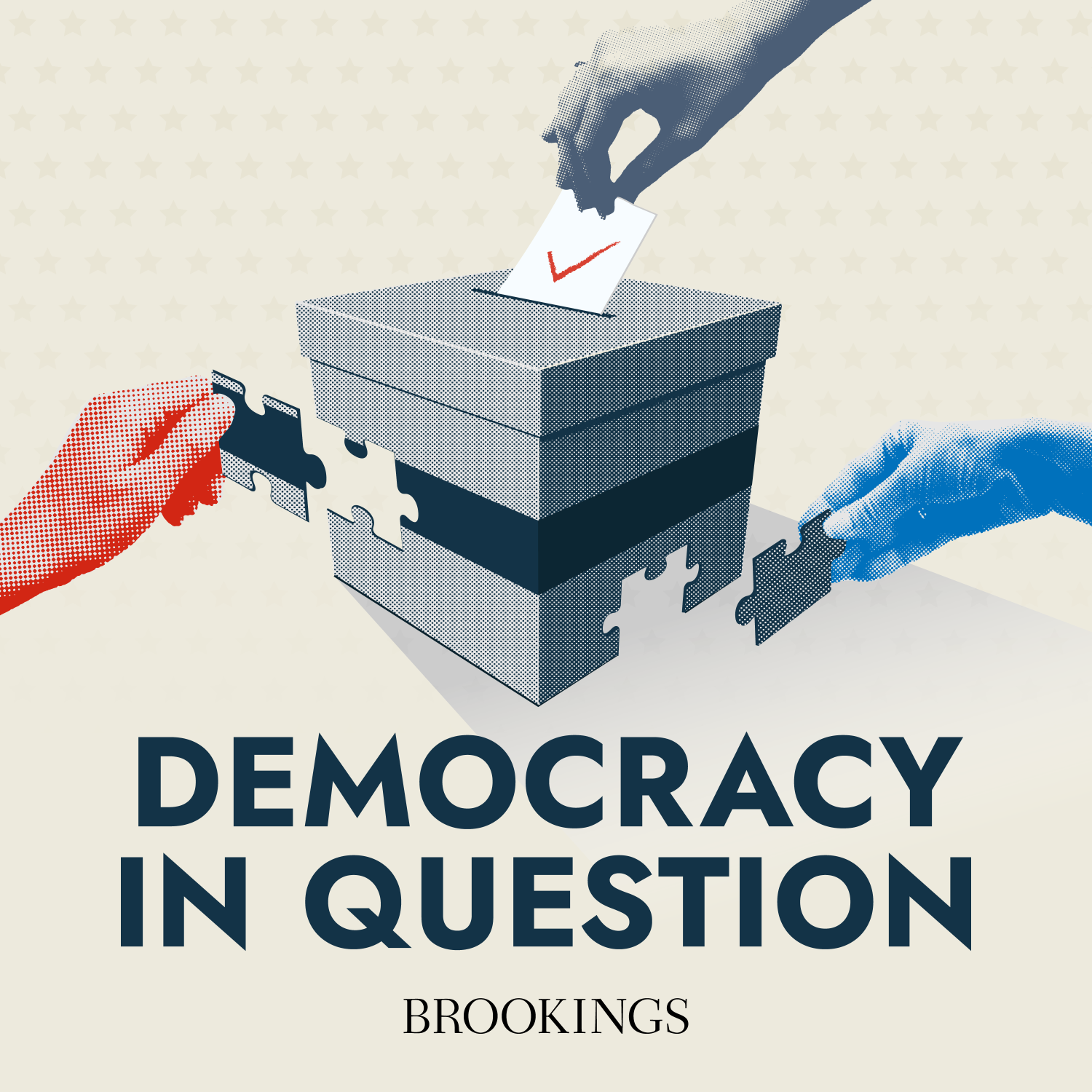

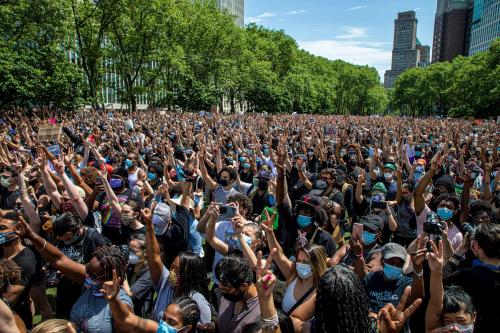
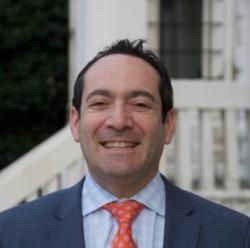
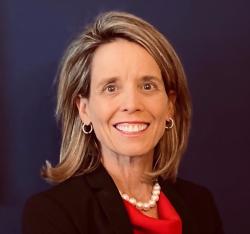

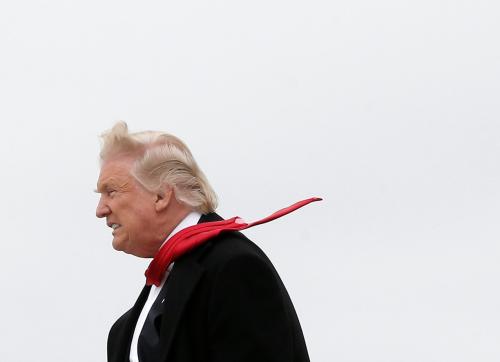
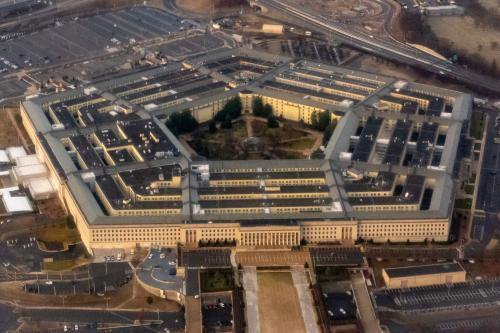
Commentary
PodcastHow do we safeguard democracy?
Listen on
Democracy in Question
July 3, 2025